Red House eviction defense
The Red House eviction defense is an ongoing occupation protest in autumn and winter 2020 at a foreclosed house on North Mississippi Ave. in the Humboldt neighborhood in the Albina district, a historically Black district of Portland, Oregon, United States.[1][2][3]
| Red House eviction defense | |
|---|---|
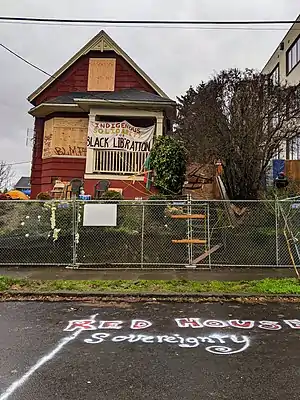 The Red House, pictured on December 13, 2020 | |
| Date | September 2020 – present |
| Location | 4406 North Mississippi Avenue, Portland, Oregon, U.S. 45°33′20″N 122°40′31″W |
| Caused by | Eviction of the Kinney family |
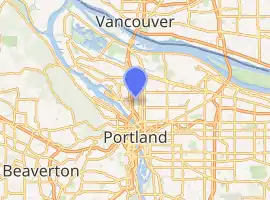
| |
The Kinneys, a Black and Indigenous family,[4] owned the house, often called the "Red House," for 65 years. They took out a mortgage on the house in the early 2000s. The loan went into default in 2016, amid confusion after it was sold. In 2018 the family lost the home in a non-judicial foreclosure proceeding,[5] but continued to live there.[6]
In September 2020, Multnomah County Sheriff's Deputies served a court order at the home and forcibly evicted the Kinneys.[7] Activists rose in support of the family and occupied the property and the surrounding area.[8]
In December 2020, law enforcement officers returned, forcibly removing activists and arresting several people. Activists then barricaded the area surrounding the house.[9][10] Police and demonstrators clashed as police tried to clear demonstrators from the area.[11]
On December 11, the Kinney family and city officials reached an agreement, barricades were removed,[12] and reports circulated that the developer might return the house to the Kinneys at cost. [13]
History and context
The elder son of the Kinney family, William X Nietzche, described the home as "unceded territory." He said gentrification is just a different word for a familiar pattern of displacement. "It's the same scheme — different word, different day."[14]
“It’s a fight against systemic racism and gentrification that’s been going on for years,” he said, and added: “My family comes from this land and to see it taken without right and by gunpoint… It’s outrageous to me.”[15]
In 1850, the Donation Land Claim Act took 2.5 million acres of tribal land –including all of Portland, from the Multnomah people– and distributed it to white settlers.[16]
Racist real estate and zoning laws kept Portland’s Black residents constrained to the North Mississippi area.[17] They were forced to move in, and then out, of their neighborhood.[18] From 1960 to the 2000s, the Albina district’s Black population decreased from 80% to less than one third.[19] Meanwhile property values tripled and sometimes quadrupled.[20]
“This systemic discrimination, which was also practiced nationwide and goes back to the origins of our country, has harmed communities of color by excluding them from homeownership and wealth-building opportunities; denying them access to educational resources, jobs and healthy neighborhoods; and perpetuating segregation, displacement, and harmful stereotypes through the zoning code, deeds and covenants, lending practices, public housing and urban renewal.” –Historical Context of Racist Planning: A history of how planning segregated Portland [21]
Kinney family
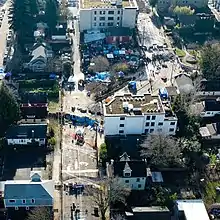
Pauline and William Kinney sold the Red House to William Kinney, Jr. and his wife, who is Upper Skagit,[22] in 1995. In the early 2000s, the younger Kinney family mortgaged their home, which had by that time been in their family for 65 years, in order to pay legal fees after their son was found guilty of a felony in which he killed a man and injured the dead man's wife in 2002 while driving on a suspended driver's permit. The mortgage was from Freedom Mortgage Corporation in May 2002. In March 2004, they refinanced that loan with Beneficial Oregon Incorporated.
In December 2016 the loan was transferred to another company. According to a website created by supporters of the Kinney family, the family began receiving bills from the previous mortgage company and from the new one, and so began putting payments into an escrow account instead of paying the bills while the billing issue could be resolved.[23] However, according to reports by The Oregonian, "it’s not clear if that account was ever set up," and the Kinney family missed 17 payments for over a year.[24] Multiple communications were made between the Kinney family and lenders during this period which questioned the lenders' jurisdiction, with rhetoric "consistent with the so-called sovereign citizen movement". The Kinneys would mark forms "void" and return them, and claimed that "the company had no jurisdiction".[24]
William Kinney III and his mother have stated in court filings and on social media[25][2] that the law and the courts do not have jurisdiction over them.[26] J.J. MacNab, a research fellow at the George Washington University's Program on Extremism, said that their rhetoric was similar to that of Ammon Bundy in his occupation of the Malheur National Wildlife Refuge.[25] The Kinney's social media posts have also referred to QAnon and other conspiracy theories.[25][2]
The Kinneys owed $97,000 in 2018 when the house was put into foreclosure and purchased by a developer for $260,000.[3] The family states it has had trouble finding an attorney who would take their cases, often needing to be represented by their son, William Kinney III.[2] According to reporting from Oregon Public Broadcasting, legal experts believe if the Kinney family had adequate legal representation in 2016, they likely could have avoided the foreclosure. The same reporting emphasizes the significance of the non-judicial foreclosure process, which lacks many of the legal protections that would have been in play if a judge had overseen the foreclosure proceeding.[27]
William III, who also goes by William X. Nietzche, has frequently spoken out about the situation on social media.[25] The Kinneys have alleged that the mortgage lender and an investment company deliberately tried to remove the Kinneys from the house in order to redevelop the land. Portland Mayor Ted Wheeler took a different view, writing on Twitter, "There was a lengthy, thorough judicial proceeding resulting in a lawful judge's order to evict people illegally occupying a home."[23]
The home has been the subject of legal conflicts and political actions ever since the foreclosure.[2][28] In September the family petitioned a judge to be allowed to stay in their home, pointing to Oregon's moratorium on evictions that had been implemented due to the COVID-19 pandemic.[29] The courts have allowed the eviction to go ahead on the basis that the foreclosure was in 2018, prior to the pandemic.[2] Protestors have argued that an eviction during a pandemic is cruel nonetheless.[2] The Kinneys began residing in hotels and with friends, and eventually in a North Portland home owned by the elder Kinneys since 1966.[23][30]
After the event, OPB author Jonathan Levinson apologized and defended the "second home" story, stating should have been reported with more context, compassion, and nuance. Ultimately Levinson defended the story a completing the Kinney's narrative.[27]
Demonstration
Initial eviction and community response
In early September 2020, Multnomah County sheriffs forcibly evicted the Kinney family. Members of the community rose in support of the family.[31]
Since September 2020,[32] activists, including those who have protested against systemic racism as part of the Black Lives Matter movement, have gathered at the home to protest the eviction of "a Black and Indigenous family that has lived there for over six decades and as a stand against further gentrification of the city's historically Black Albina neighborhood".[33][9][34] The house has become known as the "Red House on Mississippi",[9][34] or simply the "Red House".[35] Predatory lending and the criminal history of the family's son have been cited as reasons for financial difficulties leading to the foreclosure. The home was purchased at auction by Urban Housing Development LLC in 2018; the family disputes the new ownership of the house.[11] A judge ordered the family to be evicted in September 2020.[36] The family filed a federal lawsuit attempting to overturn the eviction.[37]
The sheriff's department stated that protestors have been "camping on adjacent privately owned and city-owned properties", and that 81 calls for service were made between September 1 and November 30, because of fights, shots fired, burglary, thefts, vandalism, noise violations and threats by armed individuals.[38][33]
December 2020 escalation
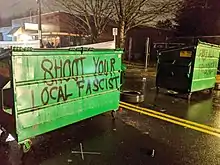
Around 5 a.m. on December 8, 2020, the Portland Police Bureau and Multnomah County Sheriff's Office arrived to evict residents, clear property, and render the house uninhabitable. They evicted the residents and arrested seven people with a small number of protesters present. The police left while anti-eviction activists threw rocks and paint balloons. Police returned to supervise the erection of a construction fence around the house, and protesters repelled the police around 10:30 a.m. Several police cars were damaged and had their tires deflated, and an officer drove into a parked car while retreating.[32][11][39][40]
While the day progressed, an estimated 200 activists reoccupied the property and constructed barricades to block all access to the house.[11][23] Protesters sealed off the intersections of North Mississippi Ave and North Albina Ave to the north of the house, as well as the surrounding entrances from North Skidmore Street and North Prescott Street. They also positioned guards at the entrances to the barricaded area.[10]
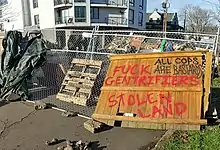
Later on December 8, Mayor Ted Wheeler authorized the Portland Police Bureau to "use all lawful means to end the illegal occupation" and said, "there will be no autonomous zone in Portland. It's time for the encampment and occupation to end. There are many ways to protest and work toward needed reform. Illegally occupying private property, openly carrying weapons, threatening and intimidating people are not among them."[38] Supporters said that the Wheeler and Lovell statements seek to "criminalize the right of Afro-Indigenous people to bear arms". They further said that the enforcement of Oregon gun laws were being more aggressively applied against Black and Indigenous people of color (BIPOC), stating "We are threatened upon speculation, while known white supremacists continue to brandish arms without consequence."[41] A representative from Community Alliance of Tenants stated that "This is not a story of an autonomous zone. This is a story of systemic oppression."[28][42]
On December 9, The Oregonian reported that guards, at least one of which was armed, had been posted at each intersection blocked by protesters, and that spike strips made of boards and nails were outside one of the barricades.[10] Willamette Week later described the guard as being part of "several physical barricades of protection and layers of guards... to make people of color feel safe standing around a fire pit" at the center of the space.[43] That same day, the Portland Police Bureau spoke to the illegality of the occupation and the possibility of violence on the site.[44] Describing this, the Portland Mercury stated that "the police continued spinning fear-mongering disinformation about the occupation".[45] On December 10, Oregon Public Broadcasting reported that protestors have been forbidding people from taking pictures or video from within the occupied zone.[2] Most such confrontations have been verbal, though that policy has at times been enforced through violence.[2]
That same day, a co-owner of Urban Housing Development LLC offered to sell the property to the family for the price he paid at the foreclosure sale in 2018, stating that "we're overwhelmed by the attention to this" and that he fears for his family's safety.[46] The co-owner has been described as a house flipper and investor.[46][47]
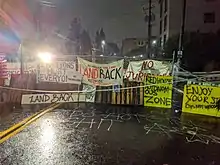
On December 11 district attorney Mike Schmidt praised "the neighbors and community members who have refused to stand by silently" and who spoke out about what was happening, but stated that some neighbors were scared to leave their homes and that "continued violence, property damage, and harm to our community is inexcusable and will be met with aggressive prosecution."[33]
December 2020 deescalation
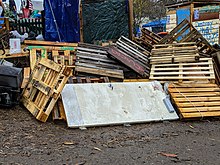
The director of the Coalition to Save Portland visited the Red House on December 11, and reported, among other things, that the Kinney family wanted a letter offering assurances that people would not be arrested or prosecuted if they worked to take down barriers.[48] Also on the 11th, a GoFundMe fundraising campaign to help the Kinney family repurchase their house surpassed $260,000, approximately the amount the developer paid for it in 2018.[49] By the 14th, the amount surpassed $300,000.[50]
Two days later, the Kinney family reached a tentative deal with the City of Portland, which would prevent the eviction as long as barricades would come down in the neighborhood.[51] The announcement was accompanied by an apology from the mayor and police chief for their tweets, in which they said that by referring to the protest as an attempted "autonomous zone" and issuing threats to the protesters, they had escalated the situation and resulted in threats to the family.[52]
Mac Smiff, a journalist and an activist involved in the protests, characterized the assurances and apology as a rare victory for protesters, and predicted that their impact would be felt across the nation.[52] The Kinney family echoed that sentiment in a statement,[53] as did City Council member Jo Ann Hardesty[54] and local news outlets.[27][55] In a press conference the following day, Mayor Wheeler expressed "disgust" at the idea that his own statements constituted a "win", saying that "we are talking about safety. And if you think that negotiating at the head of a gun is a win, you need to reevaluate."[26] He further stated that "nobody should take this as an invitation to do it anywhere else. The end result could turn out very differently."[26]
Wheeler also announced that the Kinney family and the developer had reached a "tentative" deal, but later retracted the claim.[56]
Following the announcement by the mayor and police chief, activists requested assistance in removing the barriers.[26] By December 14, they had been removed and traffic along Mississippi and Albina avenues had been restored.[53]
Willamette Week stated "if the closure of a major city street caused any neighborhood resentment, it hasn't been apparent", describing how a local coffeeshop, open during the defense, allowed activists to use their bathroom and that neighbors frequently purchased coffee for the activists. Residents also supplied material to build the barricade.[43] On December 17, KATU reported that protestors were out of the street, but that some were still camped at the house and on a neighboring lot. They stated that some neighbors were afraid to speak publicly, and that they said some protestors were still engaging in intimidating behavior.[57]
See also
- Institutional racism in housing and lending
- 2020–2021 United States racial unrest
- Black Lives Matter art in Portland, Oregon
- George Floyd protests in Portland, Oregon
- Capitol Hill Autonomous Zone
- Dignity Village, a 20-year-old autonomous tent city in Portland
References
- Burch, Liz; Harlan, Kohr (December 10, 2020). "Day 3 at Portland's Red House: Resolution in sight?". KOIN 6 News. Archived from the original on December 12, 2020. Retrieved December 11, 2020.
- Levinson, Jonathan; Haas, Ryan; Olmos, Sergio (December 10, 2020). "Understanding the ongoing 'eviction blockade' in Portland". Oregon Public Broadcasting. Retrieved December 12, 2020.
- "Portland 'Red House' occupation persists for 4th day; owner offers to sell property back to family". The Oregonian. December 11, 2020. Archived from the original on December 11, 2020. Retrieved December 12, 2020.
- "Lost by Fraud and Deceit". portlandobserver.com. Retrieved December 22, 2020.
- "Lost by Fraud and Deceit". portlandobserver.com. Retrieved December 26, 2020.
- "Oregon eviction protest fueled by history of gentrification". AP NEWS. December 9, 2020. Retrieved December 26, 2020.
- "Lost by Fraud and Deceit". portlandobserver.com. Retrieved December 26, 2020.
- Oregonian/OregonLive, Jim Ryan | The; Oregonian/OregonLive, Ted Sickinger| The; Oregonian/OregonLive, Shane Dixon Kavanaugh | The (December 8, 2020). "Protesters reoccupy longtime Black-owned N. Mississippi Ave. property after clashes with police trying to 're-secure' house". oregonlive. Retrieved December 26, 2020.
- Ellis, Rebecca; Levinson, Jonathan (December 8, 2020). "Portland mayor authorizes 'all lawful means' to clear protesters from occupied area on Mississippi Ave". Oregon Public Broadcasting. Archived from the original on December 9, 2020. Retrieved December 9, 2020.
- Ryan, Jim; Bernstein, Maxine (December 9, 2020). "Occupation outside N. Portland house continues into Wednesday; no police presence at scene". The Oregonian. Archived from the original on December 9, 2020. Retrieved December 10, 2020.
- Ryan, Jim; Sickinger, Ted; Kavanaugh, Shane Dixon (December 8, 2020). "Protesters reoccupy longtime Black-owned N. Mississippi Ave. property after clashes with police trying to 're-secure' house". The Oregonian. Archived from the original on December 8, 2020. Retrieved December 9, 2020.
- Oregonian/OregonLive, Shane Dixon Kavanaugh | The (December 14, 2020). "Portland 'red house' occupation: Barricades come down, but family says developer hasn't reached out to them". oregonlive. Retrieved December 26, 2020.
- "Portland police ask for clear streets at barricaded house". AP NEWS. December 11, 2020. Retrieved December 26, 2020.
- Sparling, Zane. "Red House remains 'unceded territory,' Portland family says". joomlakave. Retrieved December 26, 2020.
- "Portland protesters occupy street in bid to stop eviction of family of color". the Guardian. December 10, 2020. Retrieved December 26, 2020.
- "Oregon Donation Land Act". www.oregonencyclopedia.org. Retrieved December 26, 2020.
- "Portland police ask for clear streets at barricaded house". AP NEWS. December 11, 2020. Retrieved December 26, 2020.
- "Understanding the ongoing 'eviction blockade' in Portland". opb. Retrieved December 26, 2020.
- "(PDF) Bleeding Albina: A History of Community Disinvestment, 1940-2000". ResearchGate. Retrieved December 26, 2020.
- "(PDF) Bleeding Albina: A History of Community Disinvestment, 1940-2000". ResearchGate. Retrieved December 26, 2020.
- "History of Racist Planning in Portland". Portland.gov. Retrieved December 26, 2020.
- "The Story / Red House on Mississippi". Red House on Mississippi. Retrieved December 29, 2020.
- Johnson, Kirk (December 10, 2020). "Protesters Erect Barricades in Portland to Save a Black Family's House". The New York Times. Archived from the original on December 12, 2020. Retrieved December 12, 2020.
- Sickinger, Ted. "Portland family's path to 'red house' foreclosure was long, filled with bizarre twists". oregonlive. The Oregonian. Retrieved January 28, 2021.
- Crombie, Noelle (December 11, 2020). "Sovereign citizen ideology embraced by Kinney son, mother in 'red house' legal fight: 'This case is a political case'". The Oregonian. Retrieved December 12, 2020.
- Kavanaugh, Shane Dixon (December 14, 2020). "Portland 'red house' occupation: Barricades come down, but family says developer hasn't reached out to them". The Oregonian. Retrieved December 15, 2020.
- Levinson, Jonathan (December 15, 2020). "Think Out Loud: Kinney family may be able to buy back Red House". Oregon Public Broadcasting. Retrieved December 16, 2020.
- "As police call for end to encampment at 'Red House,' activists say they'll continue to fight for family". KGW. December 9, 2020. Archived from the original on December 10, 2020. Retrieved December 10, 2020.
- Flaccus, Gillian (December 10, 2020). "Large Oregon gentrification protest stretches into 3rd day". Associated Press. Archived from the original on December 10, 2020. Retrieved December 12, 2020.
- Levinson, Jonathan; Olmos, Sergio (December 11, 2020). "Family at center of 'Red House' protests owns second Portland home". Oregon Public Broadcasting. Archived from the original on December 12, 2020. Retrieved December 12, 2020.
- Leighton, Michael (November 3, 2020). "Lost by Fraud and Deceit". The Portland Observer. Archived from the original on December 8, 2020. Retrieved December 10, 2020.
- Flaccus, Gillian (December 9, 2020). "Oregon eviction protest fueled by history of gentrification". Associated Press. Archived from the original on December 9, 2020. Retrieved December 10, 2020.
- Selsky, Andrew; Flaccus, Gillian (December 12, 2020). "Portland police ask for clear streets at barricaded house". Associated Press. Retrieved December 12, 2020.
- Ellis, Rebecca; Levinson, Jonathan (December 9, 2020). "Portland family explains problems that led to foreclosure as protest blockade continues". Oregon Public Broadcasting. Archived from the original on December 10, 2020. Retrieved December 10, 2020.
- Sparling, Zane (December 8, 2020). "Portland mayor vows to clear protesters' eviction blockade". Portland Tribune. Archived from the original on December 9, 2020. Retrieved December 11, 2020.
- Crombie, Noelle (December 9, 2020). "A son's crimes spurred the financial problems that led family to lose N. Portland house now at center of activist occupation". The Oregonian. Archived from the original on December 10, 2020. Retrieved December 11, 2020.
- Tilkin, Dan (December 9, 2020). "Ongoing legal drama surrounds Red House eviction". KOIN 6 News. Archived from the original on December 12, 2020. Retrieved December 11, 2020.
- Vera, Amir; Toropin, Konstantin (December 12, 2020). "Tensions over eviction of Black-Indigenous family in Portland reach boiling point as protesters clash with police". CNN. Retrieved December 12, 2020.
- Bernstein, Maxine; Perry, Douglas (December 9, 2020). "Portland's red house occupation launched spontaneously, but protesters barricade for long haul". The Oregonian. Archived from the original on December 10, 2020. Retrieved December 11, 2020.
- Gaitán, Catalina; Herbert, Brooke (December 8, 2020). "Occupation outside North Portland home continues, despite mayor's condemnation, warning". The Oregonian. Archived from the original on December 10, 2020. Retrieved December 11, 2020.
- Walker, Richard Arlin (December 12, 2020). "The painful history of Portland's 'Red house'". Indian Country Today. Retrieved December 12, 2020.
- "'There will be no autonomous zone in Portland' | Wheeler says encampment at 'Red House' must end". KGW. December 8, 2020. Archived from the original on December 10, 2020. Retrieved December 11, 2020.
- Smith, Suzette; Yau, Justin (December 15, 2020). "Armed Activists Seized Three Blocks of a North Portland Residential Neighborhood. Here's What It Was Like Inside the Encampment". Willamette Week. Retrieved December 15, 2020.
- "PPB Updates Public on North Portland Occupation". portlandoregon.gov. Portland Police Bureau. December 9, 2020. Retrieved December 13, 2020.
- Humphrey, Wm. Steven (December 10, 2020). "Good Afternoon, News: FDA Panel Okays Vaccine, McConnell Kills COVID Relief, and 100 Cowards Sign on For Trump's Lawsuit". Portland Mercury. Archived from the original on December 11, 2020. Retrieved December 10, 2020.
- Manning, Jeff (December 10, 2020). "Investor at center of N. Portland occupation says he's ready to sell the 'Red House' back". The Oregonian. Archived from the original on December 11, 2020. Retrieved December 10, 2020.
- Humphrey, Wm. Stephen (December 11, 2020). "Good Afternoon, News: Oregon's Vaccine Rollout, White House Threatens FDA, and Trump's Texas Lawsuit Goes Down In Flames". Portland Mercury. Archived from the original on December 12, 2020. Retrieved December 11, 2020.
The Oregonian is reporting that the Red House's current owner—a house-flipper—is interested in selling the house back to the recently evicted tenants.
- Dowling, Jennifer (December 11, 2020). "'Long arms, Glocks, 300 people': Red House is heavily armed". KOIN 6 News. Retrieved December 15, 2020.
- Colarossi, Natalie (December 11, 2020). "As Portland protests 4th day, GoFundMe raises $260K to save 'Red House'". Newsweek. Retrieved December 15, 2020.
- Brokaw, Sommer (December 14, 2020). "Barricades removed in Oregon neighborhood protest against family's eviction". United Press International. Retrieved December 15, 2020.
- Levinson, Jonathan (December 14, 2020). "Family and developer reach tentative deal to end N. Mississippi standoff". Oregon Public Broadcasting. Retrieved December 14, 2020.
- Kavanaugh, Shane Dixon; Gaitán, Catalina (December 13, 2020). "'Red house' family reaches deal with city; barricades coming down in North Portland". The Oregonian. Retrieved December 15, 2020.
- Kavanaugh, Shane Dixon (December 14, 2020). "Portland 'red house' protesters' aura of success could prompt more occupations over foreclosures, Mayor Wheeler concedes". The Oregonian. Retrieved December 16, 2020.
- Hardesty, Jo Ann [@JoAnnPDX] (December 14, 2020). "I have been closely monitoring the evolving situation on North Mississippi and am encouraged to see it moving towards a positive resolution. Full statement below" (Tweet) – via Twitter.
- Budnick, Nick (December 15, 2020). "Anti-fascist, sovereign citizen tactics combine at Red House". Portland Tribune. Retrieved December 18, 2020.
- Kavanaugh, Shane Dixon; Gaitán, Catalina (December 13, 2020). "'Red house' family reaches deal with city; barricades coming down in North Portland". The Oregonian. Retrieved December 14, 2020.
- "Some neighbors near Portland 'Red House' say situation still tense". KATU. December 16, 2020. Retrieved December 18, 2020.